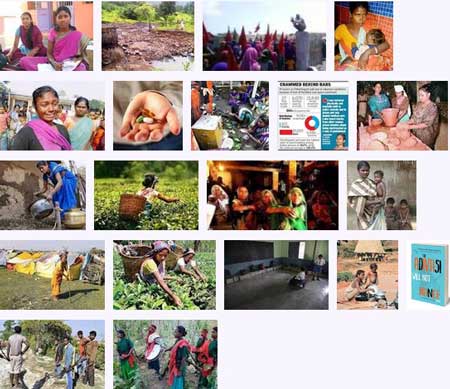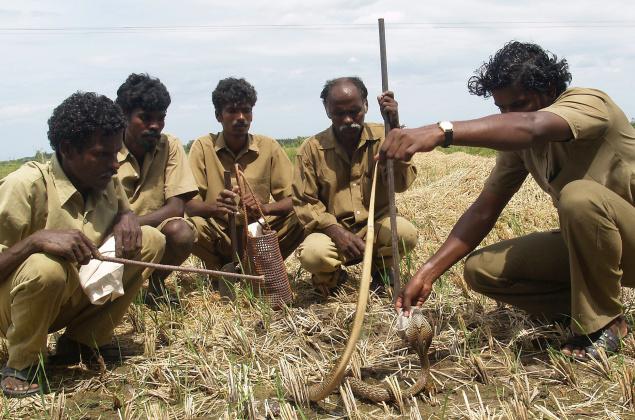Learn more about the Irula Tribal Women’s Welfare Society | YouTube video on ITWWS >>
How Tamil Nadu’s Irula students are struggling to pursue higher education | To read the full story in the New Indian Express, click here >>
As [the correspondent] travels across the northern districts of Villupuram, Kallakurichi, Vellore, and Tiruvannamalai, it becomes clear that hundreds of Irula students, like Dhanalakshmi, have been struggling without a community certificate that will help them study higher. But, most of them, unlike her, did not continue their fight. They made peace with the fact that college education was beyond their means, and chose whatever profession they could find.
Contrary to popular perception, it’s not low marks that make students dependant on community certificates. It is because the certificate provides them with much-needed social and economic support — in the form of scholarships, stipends, and hostel accommodations. Without these benefits, activists say, most Irula families will not be able to afford a higher education. Thanks to the difficulty in getting a certificate, most Irula youngsters in the northern districts discontinue studies after classes 10 or 12.
“Over half of the Irulas living in Villupuram and Kallakurichi lack a house patta,” says Piraba Kalvimani, a social activist who has been working with Irulas for the last two decades. “A quarter of them do not have community certificates. Though the Constitution guarantees them reservation, it is being denied.” […]
The trouble, activists say, is with officials taking terminologies too literally. The initial definition and continuing general perception is that Irulas are hill-tribes (Malivazhmakkal). However, the reality is that many of them have migrated or were forcibly brought down to the plains over the years. Now, the ones living in plains are treated as frauds, say activists. As Tamil literature and history recognises only the hill-folk as tribals, those who moved, or were pushed out, are not being recognised. In the early nineties, hundreds of people associated with the National Adivasi Solidarity Council staged a hunger-strike in Chengalpattu after they were denied community certificates repeatedly. […]
The process some officers adopt, he says, is very insulting and reinforces caste stereotypes. “In order to prove they really are Irulas, applicants are asked to catch snakes and rats,” he says. “They are made to sing and dance in government offices before being sent back, empty-handed.
Some have even asked how they can be an Irula if they are not sexually promiscuous.” As a result, Kandasamy says, generations that have moved to suburbs and plains are taught about their ancestral practices so that they can answer the questions asked by authorities. Not all officials are bad, reiterate the activists and the community members. There are many involved Collectors and tehsildars who actively conduct camps and issue certificates. […]
Within the community though, Dhanalakshmi is their new hero, shining light on an issue that was neglected largely in the outside world, inspiring many more youngsters. 17-year-old C Sangeetha is one such aspirant, who is pursuing a course in nursing from a nearby college. She was the first from her village to clear class 10 and class 12 exams. With the entire village enthusiastic about her success, she managed to secure a certificate just before joining the college. “I want to become a sub-collector,” says Sangeetha, talking to Express. But, why a sub-collector and not, say, a district collector? “Because it’s the sub-collector who issues community certificates. If I become one, I would ensure all children of my community get a certificate. I want that power.”
Source: “Anguish Bonafide: How Tamil Nadu’s Irula students are struggling to pursue higher education” by KRITHIKA SRINIVASAN & SUSHMITHA RAMAKRISHNAN (New Indian Express, 2 August 2020)
URL: https://www.newindianexpress.com/states/tamil-nadu/2020/aug/02/anguish-bonafide-how-tamil-nadus-irula-students-are-struggling-to-pursue-higher-education-2177957.html
Date visited: 3 August 2020

Indian magazines and web portals >>
CULTURE: The Irular festival not only showcased tribal traditions but also highlighted the community’s attempt to retain their culture while integrating with society.
On the moonlit night of February 27, around 20,000 Irulars gathered on the shores of Mahabalipuram beach to celebrate the 24th Maasi Magam Peruvizha, an all-night annual cultural and religious event. Organised by Irular Tribal Women Welfare Society (ITWWS), it was an attempt to showcase their distinctive heritage and culture.
Missing amenities
“Half of our six-and-a-half lakh strong community has not been provided with voter identity cards, community certificates and land records. This festival addresses these issues in public while increasing our dignity and enhancing a feeling of belonging among us. Here everyone is gathered with great hope for a better tomorrow,” says K.Selvi, coordinator of ITWWS.
Basically Irulars are Hindus, but the elements of their traditional religion are still visible in their lives. This festival welcomes back Kanniyaman, their goddess of nature, into their lives. Legend has it that the goddess abandoned them because of their sinful and reckless way of living. This festival is a way of appeasing her anger and recovering her blessing.
Folk songs, dances, skits and drama talked about the community’s grievances besides spreading social messages such as the need to avoid alcohol and tobacco. There was also a stall to showcase their unique traditional herbal medicines.
Early next morning, the Irulars started putting up small shacks made of neem stems and leaves on the beach for rituals and also built seven steps to invite Kanniyamanback into their lives. “It is our fiesta,” says Mani, an Irular. “It increases togetherness and strengthens our bonds. Also, the money saved by conducting community marriages can be diverted to the education of future generations,” adds this snake catcher-turned-mason.
Some of the Irulars gathered there felt their community’s increasing literacy levels and economic status has helped them. “With the help of voluntary organisations and the government we are learning new skills to survive. Mobilisation of human resource, spreading awareness of our laws and more political involvement among us are some solutions for our problems,” comments Suder Olie Sundaram, president of Scheduled Tribe Irular Federation (STIF). […]
Irulars are a tribal community who live in southern India, mainly in Kanchipuram, Nilgiris and Villupuram districts of Tamil Nadu. Ethnically they belong to the Negroid race. Their language, Irula, is a mix of Tamil and Kannada.
The name Irular means ‘people of darkness’ in Tamil. This could refer to either their dark complexion or the fact that their important events traditionally take place in the darkness of night.
Their main occupations were snake and rat catching besides trading in snake skin and forest product such as in honey, beeswax and forest wood. The Irula economy began to decline after the laws to prevent snake skin trade and preserve forest regions were enacted. But things have improved after the spread of education and alternative livelihood options were made available. Their story is one of struggle against the invasion of modern civilisation and a reinvention of their own way of life.
Justin is a II year P.G. student of Mass Communication at Madras Christian College.
Source: The Hindu : Life & Style / Nxg : Snake-catchers’ night out
Address : http://www.thehindu.com/life-and-style/nxg/article223979.ece
Date Visited: Tue Apr 17 2012 15:53:38 GMT+0200 (CEST)
[Bold typeface added above for emphasis]
“We are so much more than that. We follow a tradition rich in music, dance and love.” – Author Swarnalatha who runs an NGO that works for the upliftment for people of her Irula community >>
Related posts

Photo credit: M. Karunakaran © The Hindu >>
Learn more about the Irula community & Snake >>
Learn more
Atree.org | Ashoka Trust for Research in Ecology & the Environment (posts)
Biodiversity | Hyderabad biodiversity pledge | Nilgiri Biosphere
Climate change | Audio | The Climate Question (BBC Podcast)
eJournals & eBooks | Background guide for education
eLearning: Center for World Indigenous Studies
Forest Rights Act (FRA) | Hunter-gatherers | Legal rights over forest land
Health and nutrition | Recommendations by the Expert Committee
“The tribal food basket has always been diverse and nutritious”
United Nations on climate change
What is the Forest Rights Act about?
Who is a forest dweller under this law, and who gets rights?